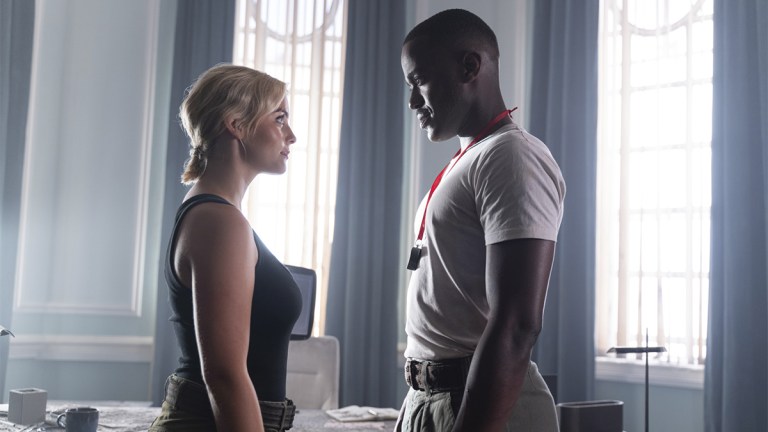Doctor Who Series 14 Episode 8 Review: Empire of Death
With big emotions, an iconic villain and great performances, the Doctor Who finale leaves the show on a solid footing. SPOILERS

Warning: This Doctor Who review contains spoilers.
As “The Legend of Ruby Sunday” reached its cliffhanger ending, we witnessed the ancient alien Sutekh return to full power. A formidable foe even in a weakened state, the prospect of seeing the self-styled God of Death unleashed was certainly tantalising. What would he do?
The answer, it turns out, is the obvious one – kill everything in the universe.
“Empire of Death” is a solidly entertaining episode. It pays off most of the major mysteries set up since last year’s specials, it gives the Doctor and Ruby a massive challenge to solve, an iconic villain to beat, and lots of big emotions. There are plenty of good scenes and one really great one. Everyone gives it their all, especially the two leads.
That said, there’s something about the episode that feels a little perfunctory, as if it’s ticking off the various boxes that a series finale demands. There’s nothing particularly egregious (the explanation of Ruby’s mother’s ominous pointing is the only thing that disappoints), but it also rarely feels elevated.
This might partly be down to that aforementioned iconic villain. A revisionist spin on Sutekh would arguably be very difficult to pull off, because the character is effectively death incarnate so there’s not much room for ambiguity or subversion there. And “Empire of Death” gives us exactly what we might expect from an unleashed Sutekh – less than ten minutes into the episode, he’s already murdered everybody on Earth.
That’s audacious (though as one of the biggest movies of the last few years also had a villain turn vast swathes of the universe to dust, “Empire of Death” might feel visually familiar to Marvel fans – a comparison director Jamie Donoghue might well welcome). But once it’s done, and the death wave continues to spread implacably across the cosmos, we hit the limits of the concept. Death is about as final as it gets. This isn’t like a hostile takeover by an alien species, where we can see the rise and eventual triumph of a resistance. Everyone dies. It’s weirdly anti-climactic, in a way, though that in itself is interesting. All that’s really left is for the Doctor to find a time-wimey way of reversing it, because we know from the get-go that it has to be reversed.
That’s not a bad thing. Of course it has to be reversed. It would be rubbish if it wasn’t. But it does contribute to the finale’s sense of going through the motions. There’s no deep conversation to build up to between the Doctor and Sutekh, no meaty ethical equivalence or contrast to explore, no matter how hard the writing (and Ncuti Gatwa’s acting – once again a priceless special effect) tries to sell the moral ambiguity of the Doctor killing him. Sorry, but no matter how highly the Doctor values life, there is no ambiguity there. Sutekh deliberately, gleefully slaughtered nearly everybody in the universe. He has to go!
The best scene in the episode is the conversation between the Doctor and the unnamed “Kind Woman” played by Sian Clifford. It’s a welcome change of pace after the episode’s frantic opening, melancholy and quietly unsettling – the concept of memory itself dying, and the perversity of the death wave travelling backwards from child to parent, are both absolutely horrifying in the best way. The effectiveness of the scene hinges on the strength of its guest performance, and Clifford makes the absolute most of her few minutes, showing us with no histrionics the intimate human toll of Sutekh’s “gift”. The moment where she remembers her child is dead is particularly wrenching, mostly because of how underplayed it is.
This is arguably the scene that really elevates the episode, and it shows Russell T Davies at his best. He understands that universal genocide is hard, if not impossible, for us to comprehend, so we need a scene where we see the impact on an ordinary person. It brings it home in a way that not even the Doctor’s screams of agony – and that wonderful zoom out from the TARDIS hanging in space against a backdrop of dying planets – quite manage.
It also ties into the big thesis of the episode, which thankfully isn’t just “life is better than death” (because, duh), but is more about the importance of ordinary people. Ruby’s mother isn’t some eldritch cosmic force, a mysterious being more powerful than Sutekh. She was just a scared teenager who wanted a better life for her daughter, someone “completely ordinary”, who only became important because she was considered to be so.
That’s a nice idea, and it’s fun to see Sutekh become obsessed with discovering her identity, the one mystery left in the universe after he’s destroyed it. There’s something poetic in the concept of an alien god being flummoxed by what turns out to be a normal human woman (though you almost start to feel sorry for poor Louise, with everyone constantly harping on about how “ordinary” she is). The episode ultimately becomes more about Ruby’s reunion with her mother, with the defeat of Sutekh and restoring life to the universe handwaved away with some intelligent rope, a whistle, and a trip through the vortex. And while it’s a shame that there’s no real payoff to this season’s engagement with superstition and folklore, beyond the concept of Louise becoming impossible because Ruby believes she is, their reunion is pleasantly low key, and both Millie Gibson and Faye McKeever fully sell the complicated emotions at play.
It all hangs together, though whether you find the various resolutions satisfying is another matter. It’s still not entirely clear why basing Susan Triad on the Doctor’s granddaughter made her “the perfect trap”, when the Doctor himself didn’t even clock the possible connection until the last minute. And while the explanation for Louise’s pointing makes emotional sense for Ruby, it makes absolutely bugger-all sense as something a scared 15-year-old would actually do in that situation, with nobody around to see it. Ditto her choice of outfit. We do get a bit of welcome closure for some leftover threads from “73 Yards” (which turns out to be the exact range of the TARDIS’ perception field), though more questions are raised in the process. Roger Ap Gwilliam, it seems, is still destined to rise, and the Doctor will have some involvement in his downfall.
At the end of the episode, the Doctor basically tells Ruby that her character arc is complete, and that she can’t travel with him anymore because her “adventure is just beginning.”
Does this work? Yes and no.
To look at Series 14 as a whole, it’s been a pretty damn good series of Doctor Who. High energy, confident, mostly stellar production values, a charming Doctor-companion pairing with real emotional range, lots of fun and interesting ideas. Even with the episodes that haven’t quite come together, there has been plenty to talk about. Overall, the show is in a good place, and the foundations for the era to come are more-than solid.
Looking back, though, the standalone stories are what have really resonated, and the arc plot elements feel like more of an afterthought. Unfortunately, this blunts the impact of the finale. The Susan Triad stuff is basically fine, it’s a sci-fi mystery with a sci-fi explanation that makes sense in terms of the villain and his machinations. But with Ruby’s arc, the breadcrumb approach is less successful. After the Christmas special and “Space Babies”, there just hasn’t been enough focus on her mysterious parentage as an animating force. The mysterious snow is a great recurring visual, and there have been effective individual moments like her desperate appeal to the ambulance in “Boom”. But Ruby has generally seemed happy, her relationship with the Doctor has been solid, and they’ve been having fun together.
Which is great! That’s what we’re here for, after all, even if a smidgeon of conflict might have spiced things up a bit. But it means that the resolution of “Empire of Death”, with Ruby’s adventures in the TARDIS seemingly over (even though we know Millie Gibson will be back), feel a tad arbitrary. Is the implication meant to be that Ruby has embraced travelling in the TARDIS because she’s missing something? If so, that hasn’t really shown in her behaviour.
Of course, everybody does the work in “Empire of Death” to sell the emotions. One silent, tearful close-up on Ncuti Gatwa and Millie Gibson’s faces can fill in a lot of blanks. But those blanks are still there, and it means that the season as a whole doesn’t feel entirely rock solid in terms of its emotional progression. As with “The Legend of Ruby Sunday”, it feels more like we’ve reached the end, so now this stuff has become important. There has been much discussion among fans about the ordering of this season’s episodes, and whether a slightly different order would have helped with that sense of progression – I’m inclined to think that it might have.
Regardless, there are delights to be found here. Everything involving Mel is great, and Bonnie Langford gets the opportunity to play lots of different subtle emotional shades. Importing the memory TARDIS from Tales of the TARDIS is lovely and makes perfect sense, and Ncuti gets to show us some very Doctor-ish glee in the face of doom, grinning “No idea” when Ruby asks him if it can fly. Saving the universe with a spoon is the kind of thing you can only get away with in Doctor Who, which is surely why we love it. The visual of big gangly CGI cat-dog-horse-thing Sutekh being dragged through the vortex is ludicrous, but again, the sort of ludicrous that’s baked into the DNA of the show. Anita Dobson gets some creepy beats to play as Mrs Flood, which are generally much more interesting than when she’s in kooky look-to-camera mode.
She also calls the Doctor “that clever boy”. Mrs Flood = Clara confirmed?
So, there we are. Doctor Who is back. Doctor Who never went away. The future is uncertain. The future is bright.
See you at Christmas.
Doctor Who series 14 is available to stream on BBC iPlayer and Disney+. Learn more about Den of Geek’s review process and why you can trust our recommendations here.
